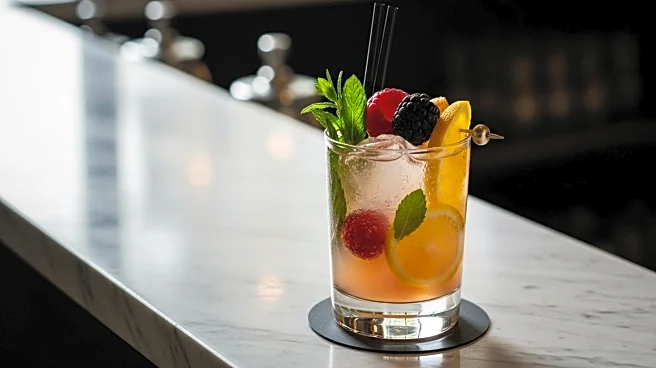What is the story about?
What's Happening?
The non-alcoholic beverage industry is experiencing significant growth in the United States as more Americans choose to moderate their alcohol consumption. According to a report by Investopedia, the market for alcohol-free beer, wine, and spirits is projected to reach $5 billion by 2028. This trend is driven by a growing awareness of the health risks associated with alcohol consumption, as well as a cultural shift towards sobriety. The decline in alcohol consumption is most pronounced among young adults, with those under 25 drinking 17% less than older adults. This shift has led to the proliferation of non-alcoholic beverage options, with businesses like Spirited Away in Manhattan and Cheeky & Dry in Seattle reporting booming sales. Major alcohol manufacturers are also entering the market by offering zero and low-alcohol options.
Why It's Important?
The rise of the non-alcoholic beverage industry reflects broader societal changes in attitudes towards alcohol consumption. As health consciousness increases, consumers are seeking alternatives that allow them to enjoy social experiences without the negative effects of alcohol. This shift presents opportunities for businesses to innovate and cater to a growing market segment. Additionally, the trend may influence public health positively by reducing alcohol-related health issues. However, it also poses challenges for traditional alcohol producers who must adapt to changing consumer preferences. The success of non-alcoholic beverages could lead to a reevaluation of social norms around drinking and potentially decrease the prevalence of alcohol-related problems.
What's Next?
As the non-alcoholic beverage market continues to grow, more companies are likely to enter the space, increasing competition and innovation. Established alcohol brands may expand their product lines to include more non-alcoholic options to capture this emerging market. Additionally, the trend towards sobriety could influence public policy, potentially leading to new regulations or incentives for non-alcoholic beverage production. Consumer behavior will continue to evolve, with younger generations prioritizing health and wellness, which could further drive the demand for non-alcoholic alternatives.
Beyond the Headlines
The expansion of the non-alcoholic beverage industry may have cultural implications, as it challenges traditional social practices centered around alcohol consumption. This shift could lead to new social norms and redefine what it means to socialize in various settings. Furthermore, the industry's growth may encourage further research into the health benefits of sobriety and the development of functional beverages that offer mood enhancement or other health benefits without alcohol.

















